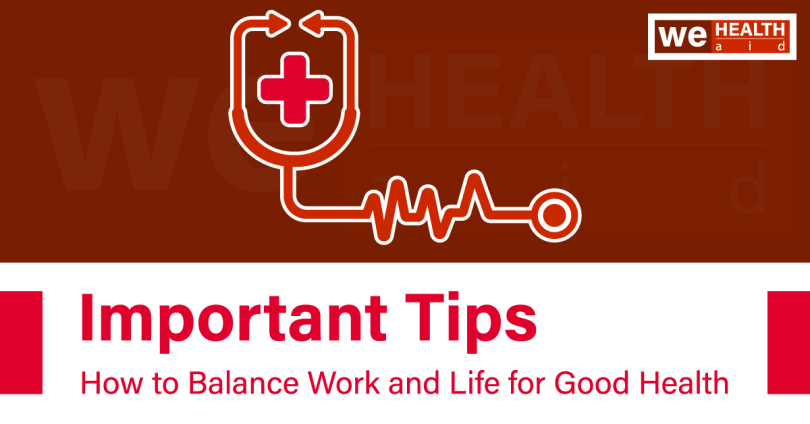The ability to balance work and life has become quite a hard nut to crack in this modern world. The demand for working hours, combined with pressures to connect and keep pace, contributes to one’s failing health. Yet, balancing work responsibilities with personal and health needs is not only crucial to professional success but also to maintaining physical, emotional, and mental well-being. Achieving work-life balance can reduce stress, increase productivity, and improve relationships. In this article, we look at 50 tips, benefits of balancing work and life, and how you can take proactive steps to protect your well-being while thriving in your professional life.
“Balancing work and life is not about dividing your time equally between them but finding harmony where both professional ambitions and personal well-being exist together without one diminishing the other. You only find real balance when you prioritize your health-physical, mental, and emotional-by setting boundaries, managing your stress, and leaving time for the people and activities that nourish your soul. You will not only grow in your career, but you’ll also build a life that’s fulfilling, sustainable, and healthy. The trick is to understand that a healthy life outside of work fuels success within the work, and vice-versa, a thriving career gives you the freedom and means to enjoy the life you’ve put so much effort into creating.”
Benefits of Balancing Work and Life for Good Health
- Reduced Stress Levels: A balanced work-life schedule reduces the likelihood of burnout and chronic stress. This helps improve your mental health and overall sense of well-being.
- Improved Mental Health: You will be in a more composed and stable state of mind by avoiding the constant pressure of work. Work-life balance promotes better emotional regulation, reducing anxiety and depression.
- Better Physical Health: It is easier to prioritize health through exercise, sleep, and proper nutrition when the demands of work are balanced with personal care.
- More Energy: Balancing work and personal life helps you recharge. Better-rested individuals have more vigor for both work and personal life.
- Improved Relationships: Once you have time for your family, friends, and social activities, your relationships begin to blossom, thus giving you an exceptionally better emotional support system.
- Higher Job Satisfaction: A good work-life balance helps avoid job-related burnout, making work less stressful and more enjoyable.
- Increased Productivity: People who take regular breaks and schedule downtime often perform more efficiently, hence becoming more productive during work hours.
- Better Quality Sleep: Work-life balance allows you to pay more attention to rest. Quality sleep enhances cognitive function and helps in managing stress.
- More Time for Hobbies: In a well-balanced life, you will be able to invest time in hobbies that will help you regain your vitality, such as reading, gardening, or other personal interests.
- Improved Focus and Creativity: Taking time off work allows you to come back to work with a fresh mind, thus enhancing your problem-solving skills and creative thinking.
- Stronger Immune System: A healthier, more balanced lifestyle supports your immune system, making it less likely that you’ll get sick frequently.
- Enhanced Personal Development: When you have free time, you can focus on personal growth activities like learning new skills or taking courses that benefit both your career and your well-being.
- Reduced Risk of Chronic Illness: A healthy balance decreases the chances of developing work-related health conditions such as high blood pressure, heart disease, and diabetes.
- Better Physical Fitness: Finding time to exercise regularly prevents the physical consequences of a sedentary work life and boosts long-term health.
- Improved Mood: A better balance between work and personal life could reduce frustration and irritability associated with being overworked, thereby improving one’s mood in general.
- Less Anxiety: Effectively dealing with stress by maintaining proper work-life balance may reduce anxiety levels and raise emotional resilience.
- Boosted Self-Esteem: A healthy balance makes one feel in control of life and is a way to increase one’s confidence and self-esteem.
- Increased Motivation: Having time for personal interests and relaxation makes you more motivated to work when the time comes.
- Lowered Risk of Burnout: Overworking can lead to mental exhaustion. Maintaining a work-life balance prevents burnout and keeps your enthusiasm for work intact.
- Financial Stability: It also allows you to have time to plan your finances, making you more economically stable as you manage your work and personal life in a balanced way.
Read More Article’s
- Superfoods: Truth or Fiction? Their Effect on Health
- Mental Health Matters: Breaking the Chains of Stigma
- Prevention Guideline: How to Prevent Common Chronic Diseases with Lifestyle Changes
- Weight Guideline: How to Manage Your Weight Healthily and Sustainably
- Hydration Unveiled: Why Drinking Water is Essential
50 Tips for Balancing Work and Life for Good Health
- Set Clear Boundaries: Establish distinct work hours and personal time. Let your coworkers know when you are available and when you are not.
- Prioritize Tasks: Focus on what truly matters. Prioritizing tasks at work and home helps prevent feelings of being overwhelmed.
- Learn to Say No: It’s essential to decline extra work or personal commitments when your plate is full. Saying no is key to maintaining balance.
- Delegate When Possible: Delegate tasks at work or at home to lighten your load and ensure you’re not handling everything on your own.
- Use a Planner: Organizing your day through a planner helps you visualize your tasks, making it easier to manage your time effectively.
- Set Realistic Goals: Avoid unrealistic expectations at work and home. Set achievable goals that won’t contribute to unnecessary stress.
- Take Breaks: Breaks are essential for productivity. Take short breaks throughout your day to re-energize your mind and body.
- Unplug after Work: Turn off your work phone or email notifications after working hours to disconnect fully from work-related stress.
- Make Time for Physical Activity: Incorporate regular exercise into your daily routine. Physical activity helps you manage stress and boosts energy levels.
- Eat Healthily: A nutritious diet is crucial for maintaining your energy. Avoid junk food and opt for healthy, balanced meals.
- Practice Mindfulness: Mindfulness techniques like meditation or deep breathing exercises can help reduce stress and improve mental clarity.
- Limit Overtime: Avoid working late regularly. Prolonged overtime can lead to physical and mental exhaustion.
- Make Sleep a Priority: Aim for 7-9 hours of quality sleep each night. Sleep is essential for recovery and overall health.
- Engage in Social Activities: Spend time with family and friends to strengthen your emotional bonds and recharge socially.
- Take Vacations: Regular breaks or vacations are necessary for long-term productivity. Disconnecting from work allows for recovery.
- Set Time for Yourself: Whether it’s a quiet moment alone, reading, or engaging in a hobby, personal time is necessary for mental relaxation.
- Create a Relaxing Home Environment: Ensure your home offers a peaceful space for rest and relaxation after work.
- Communicate with Your Employer: Be open with your employer about your needs for flexibility, especially if you’re feeling overwhelmed.
- Limit Screen Time: Reduce time spent on screens, especially during your personal hours. Avoid screens before bed to improve sleep quality.
- Incorporate Stretching: Simple stretches can relieve physical tension from sitting at a desk for long periods.
- Delegate Household Responsibilities: Share household tasks with other family members to ensure you’re not overwhelmed by personal duties.
- Practice Gratitude: Keep a gratitude journal to help you focus on the positive aspects of your work and life, reducing stress and improving mental health.
- Establish a Morning Routine: A structured morning routine can help you start the day with a sense of control and reduce the chaos that often comes with mornings.
- Stay Organized: A clutter-free workspace and home environment can reduce stress and help you stay productive.
- Engage in Creative Activities: Take time to pursue creative activities like painting, writing, or crafting, which can serve as a great outlet for stress.
- Simplify Your Life: Cut back on unnecessary commitments and simplify your schedule to make time for rest and self-care.
- Don’t Over-Schedule: Avoid double-booking yourself. Leave some open spaces in your calendar for spontaneous relaxation or personal activities.
- Learn to Manage Stress: Use stress management tools such as yoga, journaling or deep breathing exercises to alleviate tension.
- Stay Hydrated: Drinking enough water throughout the day boosts energy levels and improves concentration.
- Limit Toxic Environments: Avoid environments, whether at work or home, that drain your energy. Focus on positive, supportive people.
- Celebrate Small Wins: Recognize and celebrate achievements, whether big or small, to build motivation and maintain a positive mindset.
- Ask for Help: When life feels overwhelming, ask for help from colleagues, friends, or family members to share the burden.
- Take Regular Walks: Short walks during the day can clear your mind and keep you energized.
- Embrace Flexibility: Be adaptable to changes in your work and personal life. Flexibility can reduce stress and help you better handle challenges.
- Avoid Perfectionism: Let go of the need to be perfect. Do your best, but accept that mistakes are part of life.
- Incorporate Laughter: Laughter is a great stress reliever. Spend time with people who make you laugh and enjoy the lighter side of life.
- Focus on Quality, Not Quantity: It’s not about how much time you spend with loved ones, but the quality of that time that matters.
- Set Boundaries with Technology: Limit technology use during personal hours to ensure time for relaxation and meaningful personal connections.
- Invest in Personal Development: Take time for self-improvement through reading, learning, or practicing new skills, contributing to both career and personal growth.
- Spend Time Outdoors: Being in nature has a calming effect and is great for recharging your mental energy.
- Reflect Regularly: Take time to reflect on your work-life balance and adjust your habits as needed.
- Know Your Limits: Recognize when you’re pushing yourself too hard and take action before stress becomes overwhelming.
- Be Kind to Yourself: Self-compassion is essential. Don’t be too hard on yourself if things don’t always go as planned.
- Celebrate Work Achievements: Acknowledge your professional accomplishments and give yourself credit for your hard work.
- Disconnect from Work during Personal Time: Fully disconnect from work-related activities during personal hours to truly unwind.
- Establish Clear Communication with Your Family: Make sure your family understands your work commitments and your need for downtime.
- Engage in Community Activities: Being involved in your community fosters a sense of belonging and can provide meaningful connections outside of work.
- Plan Your Week in Advance: Plan your work and personal commitments ahead of time to reduce last-minute stress.
- Practice Positive Thinking: A positive outlook on both work and life can significantly reduce stress and improve overall health.
- Seek Professional Help When Needed: If you’re feeling overwhelmed, consider talking to a counselor or coach to help manage stress and improve your work-life balance.
Balancing work and life is not a one-size-fits-all approach, but it is crucial for maintaining good health and well-being. By applying the tips outlined in this article, you can create a sustainable and fulfilling balance between your professional and personal responsibilities. Achieving this balance is a continuous process that requires time, self-awareness, and flexibility. Remember, it’s about progress, not perfection. By setting boundaries, prioritizing health, and taking time for yourself, you can improve your productivity, relationships, and overall health. Work-life balance is an investment in your long-term happiness and success, so start implementing these strategies today for a healthier tomorrow.


